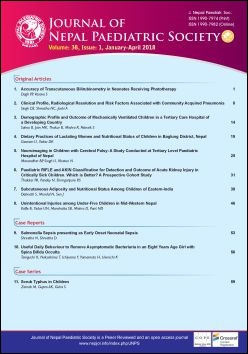Scrub Typhus in Children
DOI:
https://doi.org/10.3126/jnps.v38i1.18659Keywords:
rickettsia, re-emerging infection, multisystem involvementAbstract
Introduction: Scrub typhus is an acute febrile illness caused by infection with rickettsial bacilli Orientia tsutsugamushi. This was a retrospective observational study to study the clinical profile of paediatric scrub typhus, its associated complications and response to treatment
Material and Methods: Record files of all patients diagnosed with positive Weil felix (OXK>1:80) and Scrub IgM positive over a period of one year were analysed. Total of 10 cases were diagnosed as scrub with median age of presentation 4.1 years.
Results: Fever was present in all followed by pain abdomen (50%), rash. Anaemia (90%), lymphadenopathy (70%) hepatomegaly (100%), Leukopenia was present in those cases with fever <1 week while leucocytosis was found thereafter. Most common complication were hepatitis (100%) shock (50%), acute kidney injury (AKI) 30%, DIC in 20% cases. Secondary HLH was found in 20% and pancarditis in one case. All the cases showed dramatic response to doxycycline.
Conclusion: So a high index of suspicion is required to diagnose scrub and early initiation of treatment is essential to prevent mortality from the disease.
Downloads
Downloads
Published
How to Cite
Issue
Section
License
Authors who publish with this journal agree to the following terms:
Authors retain copyright and grant the journal right of first publication with the work simultaneously licensed under a Creative Commons Attribution License that allows others to share the work with an acknowledgement of the work's authorship and initial publication in this journal.
Authors are able to enter into separate, additional contractual arrangements for the non-exclusive distribution of the journal's published version of the work (e.g., post it to an institutional repository or publish it in a book), with an acknowledgement of its initial publication in this journal.
Authors are permitted and encouraged to post their work online (e.g., in institutional repositories or on their website) prior to and during the submission process, as it can lead to productive exchanges, as well as earlier and greater citation of published work (See The Effect of Open Access).



